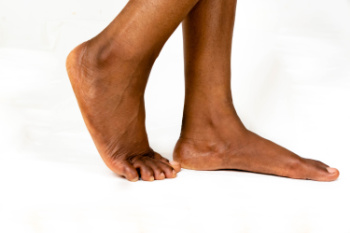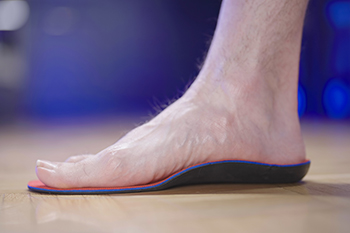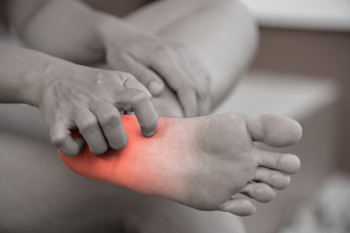
Flat feet occur when the arches of the feet collapse, causing the entire sole to make contact with the ground. This condition can lead to pain and discomfort, especially in the arch, heel, or knees. Symptoms also include swelling, fatigue, or stiffness in the feet, particularly after long periods of standing or physical activity. Flat feet can be caused by genetics, injury, or age, and may worsen over time. This condition can also contribute to misalignment, causing pain in the lower back, hips, or knees. A podiatrist can help by assessing your feet and recommending treatment options, such as custom orthotics to provide better arch support. This type of doctor may also suggest stretching and strengthening exercises to improve foot alignment and relieve discomfort. In more severe cases, surgery may be necessary. If you have flat feet, it is suggested that you schedule an appointment with a podiatrist.
Flatfoot is a condition many people suffer from. If you have flat feet, contact one of our podiatrists from Foot Doctors of Utica. Our doctors will treat your foot and ankle needs.
What Are Flat Feet?
Flatfoot is a condition in which the arch of the foot is depressed and the sole of the foot is almost completely in contact with the ground. About 20-30% of the population generally has flat feet because their arches never formed during growth.
Conditions & Problems:
Having flat feet makes it difficult to run or walk because of the stress placed on the ankles.
Alignment – The general alignment of your legs can be disrupted, because the ankles move inward which can cause major discomfort.
Knees – If you have complications with your knees, flat feet can be a contributor to arthritis in that area.
Symptoms
- Pain around the heel or arch area
- Trouble standing on the tip toe
- Swelling around the inside of the ankle
- Flat look to one or both feet
- Having your shoes feel uneven when worn
Treatment
If you are experiencing pain and stress on the foot you may weaken the posterior tibial tendon, which runs around the inside of the ankle.
If you have any questions please feel free to contact our offices located in Herkimer, and New Hartford, NY . We offer the newest diagnostic and treatment technologies for all your foot and ankle needs.

Think of foot orthotics as custom-built shock absorbers for your feet, designed to realign, cushion, and enhance every step. More than just insoles, they serve as personalized tools that adapt to the way you walk, helping to correct imbalances, reduce pain, and prevent long-term issues. Whether you are dealing with heel pain, arthritis, or just tired, achy feet, orthotics work behind the scenes to distribute pressure evenly, absorb impact, and improve posture. They can even help with knee, hip, and lower back pain by addressing misalignment at the foundation. Not all orthotics are created equal, and what works for one person might not work for another. It is suggested that you schedule an appointment with a podiatrist who can assess your needs and recommend the best option, ensuring the right fit for comfort, support, and long-term foot health.
If you are having discomfort in your feet and would like to try orthotics, contact one of our podiatrists from Foot Doctors of Utica. Our doctors can provide the care you need to keep you pain-free and on your feet.
What Are Orthotics?
Orthotics are inserts you can place into your shoes to help with a variety of foot problems such as flat feet or foot pain. Orthotics provide relief and comfort for minor foot and heel pain but can’t correct serious biomechanical problems in your feet.
Over-the-Counter Inserts
Orthotics come in a wide variety of over-the-counter inserts that are used to treat foot pain, heel pain, and minor problems. For example, arch supports can be inserted into your shoes to help correct overarched or flat feet, while gel insoles are often used because they provide comfort and relief from foot and heel pain by alleviating pressure.
Prescription Orthotics
If over-the-counter inserts don’t work for you or if you have a more severe foot concern, it is possible to have your podiatrist prescribe custom orthotics. These high-quality inserts are designed to treat problems such as abnormal motion, plantar fasciitis, and severe forms of heel pain. They can even be used to help patients suffering from diabetes by treating foot ulcers and painful calluses and are usually molded to your feet individually, which allows them to provide full support and comfort.
If you are experiencing minor to severe foot or heel pain, it’s recommended to speak with your podiatrist about the possibilities of using orthotics. A podiatrist can determine which type of orthotic is right for you and allow you to take the first steps towards being pain-free.
If you have any questions please contact our offices located in Herkimer, and New Hartford, NY . We offer the newest diagnostic and treatment technologies for all your foot and ankle needs.

Running places significant stress on the feet, toes, and ankles, often leading to injuries, including plantar fasciitis, ankle sprains, metatarsal stress fractures, and Morton’s neuroma. Plantar fasciitis involves inflammation of the plantar fascia, which is the thick band of tissue connecting the heel to the toes. It causes heel pain, especially upon waking or after prolonged activity. Ankle sprains occur when ligaments are overstretched or torn due to twisting motions, which results in swelling, bruising, and instability. Metatarsal stress injuries, frequently caused by rapid increases in running intensity, involve inflammation or stress fractures of the bones that connect the ankle to the toes. This causes pain, swelling, or tenderness in the foot. Morton’s neuroma is caused by thickened tissue surrounding nerves, typically between the third and fourth toes. It results in a sensation similar to having a pebble in the shoe, accompanied by burning pain or numbness. If you are experiencing foot pain after running, it is suggested that you schedule an appointment with a podiatrist for an exam, diagnosis, and treatment.
Exercising your feet regularly with the proper foot wear is a great way to prevent injuries. If you have any concerns about your feet, contact one of our podiatrists of Foot Doctors of Utica. Our doctors will treat your foot and ankle needs.
How to Prevent Running Injuries
Many common running injuries are caused by overuse and overtraining. When the back of the kneecap starts wearing out and starts causing pain in your knee, this is commonly referred to as runner’s knee. Runner’s knee is a decrease in strength in your quadriceps and can occur if you’re not wearing properly fitted or supporting shoes. To prevent runner’s knee, focusing on hip strengthening is a good idea, as well as strengthening your quads to keep the kneecaps aligned.
What Are Some Causes of Running Injuries?
- One cause of a common running injury is called iliotibial band syndrome.
- Plantar fasciitis is also another common injury.
- Stress fractures can occur from overtraining, lack of calcium, or even your running style.
Best Ways to Prevent Running Injuries
- Wear footwear that fits properly and suits your running needs.
- Running shoes are the only protective gear that runners have to safeguard them from injury.
- Make a training schedule. Adding strengthening exercises as well as regular stretching can help keep you strong and limber and can lessen the possibility of injuries.
- Stretching keeps muscles limber; this will help you gain better flexibility.
If you have any questions please feel free to contact our offices located in Herkimer, and New Hartford, NY . We offer the newest diagnostic and treatment technologies for all your foot and ankle needs.

Peripheral neuropathy affects the nerves in the feet, leading to symptoms such as tingling, burning pain, numbness, and weakness. This occurs when the nerves that transmit signals between the brain and feet become damaged, disrupting normal sensation and muscle function. Common causes of peripheral neuropathy include diabetes, injury, infections, and certain medications. People with peripheral neuropathy may feel as if they are wearing socks when barefoot or experience difficulty maintaining balance. The condition often worsens at night, making foot pain more noticeable. Nerve damage can also weaken the muscles in the feet and ankles, leading to instability and increasing the risk of falling. If left untreated, neuropathy may contribute to foot ulcers or deformities due to a lack of sensation and pressure awareness. A podiatrist can assess your nerve function, identify underlying causes, and recommend treatment options to help manage symptoms and prevent complications. In severe cases, surgery may be necessary to relieve nerve compression. If you experience numbness and tingling in the feet, it is suggested that you promptly schedule an appointment with a podiatrist for an exam and appropriate treatment.
Neuropathy
Neuropathy can be a potentially serious condition, especially if it is left undiagnosed. If you have any concerns that you may be experiencing nerve loss in your feet, consult with one of our podiatrists from Foot Doctors of Utica. Our doctors will assess your condition and provide you with quality foot and ankle treatment for neuropathy.
What Is Neuropathy?
Neuropathy is a condition that leads to damage to the nerves in the body. Peripheral neuropathy, or neuropathy that affects your peripheral nervous system, usually occurs in the feet. Neuropathy can be triggered by a number of different causes. Such causes include diabetes, infections, cancers, disorders, and toxic substances.
Symptoms of Neuropathy Include:
- Numbness
- Sensation loss
- Prickling and tingling sensations
- Throbbing, freezing, burning pains
- Muscle weakness
Those with diabetes are at serious risk due to being unable to feel an ulcer on their feet. Diabetics usually also suffer from poor blood circulation. This can lead to the wound not healing, infections occurring, and the limb may have to be amputated.
Treatment
To treat neuropathy in the foot, podiatrists will first diagnose the cause of the neuropathy. Figuring out the underlying cause of the neuropathy will allow the podiatrist to prescribe the best treatment, whether it be caused by diabetes, toxic substance exposure, infection, etc. If the nerve has not died, then it’s possible that sensation may be able to return to the foot.
Pain medication may be issued for pain. Electrical nerve stimulation can be used to stimulate nerves. If the neuropathy is caused from pressure on the nerves, then surgery may be necessary.
If you have any questions, please feel free to contact our offices located in Herkimer, and New Hartford, NY . We offer the newest diagnostic and treatment technologies for all your foot care needs.
